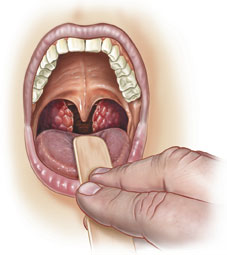 |
|||||||||||||||
|
|
 |
 |
|||||
Tonsillectomy / AdenoidectomyThis is the name given to the procedure involving removal of the tonsils. These are a paired group of lymph tissue at the side of the throat at the tongue base. Removal is recommended in cases of recurrent infection and or enlargement causing obstruction of the airway in children. The Surgery The operation is conducted under general anaesthesia, and using new techniques such as colblation, may sometimes be offered as a day stay treatment. Possible Complications and Risks Complications include post operative bleeding, which usually settles spontaneously, or may need admission to hospital and stabilisation.? Most patients experience pain, which can be severe, particularly in adult patients. The tonsils may have some immune processing function in the very young, but are redundant in older children and adults. Rarely, removal may be recommended if concern or suspicion exists that a cancer may be developing in the tonsil.
Instructions for Surgery for Tonsillectomy / Adenoidectomy You may also refer to the Preparing for Surgery patient information sheet.
FASTING: (food & liquid) from midnight for a morning operation and from 7.30am for an afternoon operation, a light breakfast of tea and toast is OK prior to 7.30am.? Children under 14 may have clear fluids only up until 10.30am, (NO MILK) but definitely nothing after 10.30am. FORMS: Hospital admission forms and anaesthetic forms should be completed and returned to the hospital at least 3 days prior to the date of your operation.? If you have any queries regarding your operation please do not hesitate to contact Dr Nicholson’s rooms. Post Operative Care Following Tonsillectomy / Adenoidectomy
Diet: It is very important to encourage a NORMAL diet (not soft) after discharge.? This assists in healing and will help prevent infection on the tonsillar bed and throat.? Chewing gum helps prevent stiffness and is good exercise for the throat area.? Encourage plenty of fluids. Pain Management: Paracetamol (liquid, soluble or tablets) is recommended 4 hourly while pain persists, ideally administered 1/2 to 1 hourly prior to meals. Expect pain to last up to 10 - 14 days. Associated earache may also be experienced and should be relieved by panadol. *Avoid aspirin at all times* Hygiene: Bad breath and white areas on the tonsillar bed are common.? Mouth washes are helpful. Convalescence: Healing usually takes up to 1-2 weeks.? School and work is not recommended prior to this.? Encourage plenty of rest, particularly in the first week. It is also important to avoid other persons with infections or colds.
Complications: Bleeding may occur up to the first two weeks following surgery.? If this occurs, however slight, please contact Dr Nicholson or the nearest doctor immediately.? If fever, or general un wellness persists consult your doctor.
Follow-Up: Your two-week follow-up appointment should be arranged prior to discharge.? It is very important that you attend this. *These notes are an outline only and should be expanded on in discussion with Dr Nicholson.
|
The patient information sheets are intended as a guide only and not to take the place of a full discussion of this procedure with Dr Nicholson |
|||||
|
